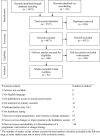Built to last? The sustainability of healthcare system improvements, programmes and interventions: a systematic integrative review
- PMID: 32487579
- PMCID: PMC7265014
- DOI: 10.1136/bmjopen-2019-036453
Built to last? The sustainability of healthcare system improvements, programmes and interventions: a systematic integrative review
Abstract
Introduction: The sustainability of healthcare delivery systems is challenged by ageing populations, complex systems, increasing rates of chronic disease, increasing costs associated with new medical technologies and growing expectations by healthcare consumers. Healthcare programmes, innovations and interventions are increasingly implemented at the front lines of care to increase effectiveness and efficiency; however, little is known about how sustainability is conceptualised and measured in programme evaluations.
Objectives: We aimed to describe theoretical frameworks, definitions and measures of sustainability, as applied in published evaluations of healthcare improvement programmes and interventions.
Design: Systematic integrative review.
Methods: We searched six academic databases, CINAHL, Embase, Ovid MEDLINE, Emerald Management, Scopus and Web of Science, for peer-reviewed English journal articles (July 2011-March 2018). Articles were included if they assessed programme sustainability or sustained outcomes of a programme at the healthcare system level. Six reviewers conducted the abstract and full-text review. Data were extracted on study characteristics, definitions, terminology, theoretical frameworks, methods and tools. Hawker's Quality Assessment Tool was applied to included studies.
Results: Of the 92 included studies, 75.0% were classified as high quality. Twenty-seven (29.3%) studies provided 32 different definitions of sustainability. Terms used interchangeably for sustainability included continuation, maintenance, follow-up or long term. Eighty studies (87.0%) clearly reported the timepoints at which sustainability was evaluated: 43.0% at 1-2 years and 11.3% at <12 months. Eighteen studies (19.6%) used a theoretical framework to conceptualise or assess programme sustainability, including frameworks that were not specifically designed to assess sustainability.
Conclusions: The body of literature is limited by the use of inconsistent definitions and measures of programme sustainability. Evaluations of service improvement programmes and interventions seldom used theoretical frameworks. Embedding implementation science and healthcare service researchers into the healthcare system is a promising strategy to improve the rigour of programme sustainability evaluations.
Keywords: change management; health policy; organisation of health services; quality in health care.
© Author(s) (or their employer(s)) 2020. Re-use permitted under CC BY-NC. No commercial re-use. See rights and permissions. Published by BMJ.
Conflict of interest statement
Competing interests: None declared.
Figures
References
-
- Organisation for Economic Cooperation and Development Tackling wasteful spending on health. Paris, France: OECD, 2017. https://www.oecd.org/health/tackling-wasteful-spending-on-health-9789264...
-
- Braithwaite J, Mannion R, Matsuyama Y, Healthcare systems: future predictions for global care. Boca Raton, FL: Taylor & Francis, 2018.
-
- World Economic Forum Sustainable health systems. Visions, strategies, critical uncertainties and scenarios. Geneva, Switzerland: WEF, 2013. https://www.weforum.org/reports/sustainable-health-systems-visions-strat...
-
- World Health Organization Everybody’s business. Strengthening health systems to improve health outcomes. WHO’s framework for action. Geneva, Switzerland: WHO, 2007. https://www.who.int/healthsystems/strategy/everybodys_business.pdf
Publication types
MeSH terms
LinkOut - more resources
Full Text Sources
Medical

